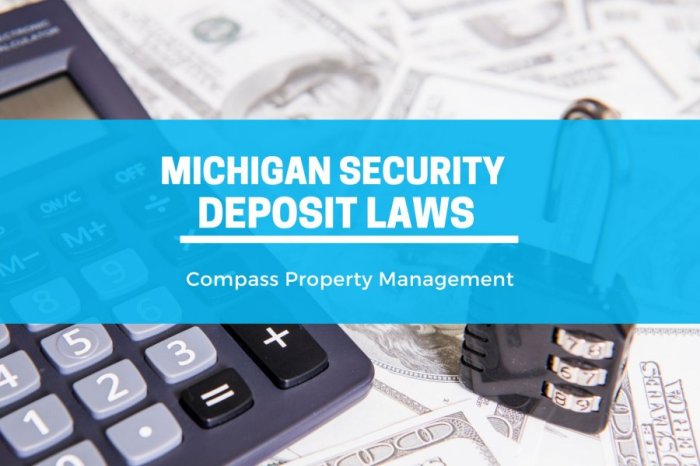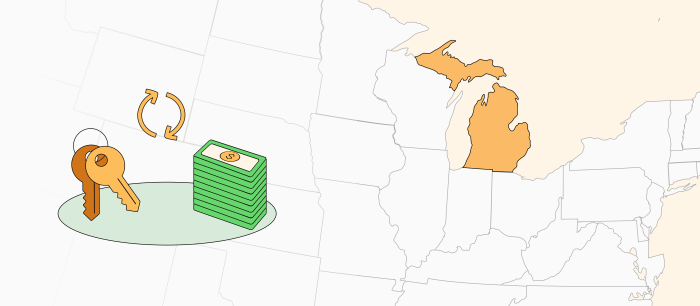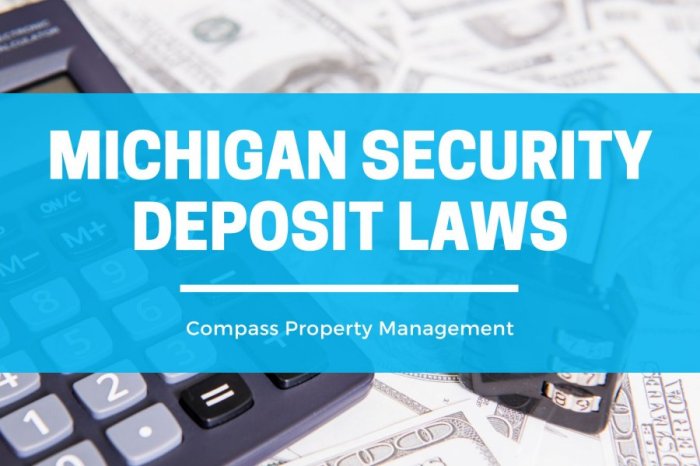The Michigan Security Deposit Law Act 348, a cornerstone of landlord-tenant relations in the state, establishes clear guidelines for the handling of security deposits, ensuring fairness and protection for both parties. This comprehensive guide delves into the intricacies of the Act, empowering landlords and tenants with a thorough understanding of their rights and responsibilities.
Enacted to safeguard the interests of both landlords and tenants, the Act Artikels the permissible deductions that landlords can make from security deposits, provides mechanisms for tenants to recover their deposits, and establishes procedures for disputing deductions. By understanding the provisions of the Michigan Security Deposit Law Act 348, landlords and tenants can navigate the complexities of rental agreements with confidence.
Michigan Security Deposit Law Act 348 Overview

The Michigan Security Deposit Law Act 348 (the “Act”) governs the handling of security deposits in residential rental agreements in Michigan. Its primary purpose is to protect both landlords and tenants by establishing clear rules and guidelines regarding the use and disposition of security deposits.
The Act applies to all residential rental agreements in Michigan, including apartments, houses, and condominiums. It sets forth specific requirements for landlords regarding the collection, holding, and return of security deposits, as well as the rights and responsibilities of tenants in this regard.
Landlord and Tenant Rights and Responsibilities
Landlords are obligated to provide tenants with a written receipt for any security deposit received. The receipt must state the amount of the deposit, the date it was received, and the name and address of the landlord. Landlords must also hold the security deposit in a separate interest-bearing account.
Tenants have the right to receive a full refund of their security deposit within 30 days of the termination of their tenancy, provided they have fulfilled their obligations under the lease agreement. If the landlord intends to make deductions from the security deposit, they must provide the tenant with a written notice within 30 days of the termination of the tenancy, itemizing the deductions and providing supporting documentation.
Security Deposit Deductions, Michigan security deposit law act 348
Landlords are only permitted to make deductions from security deposits for the following reasons:
- Unpaid rent
- Unpaid utilities
- Damages to the rental property beyond normal wear and tear
- Cleaning costs
- Lost keys
Deductions must be reasonable and supported by evidence. If a tenant disputes a deduction, they can file a complaint with the Michigan Department of Licensing and Regulatory Affairs (LARA).
Enforcement and Penalties
Tenants who believe their security deposit has been wrongfully withheld or used can file a complaint with LARA. LARA may investigate the complaint and take appropriate action, which may include ordering the landlord to return the deposit or imposing fines.
Landlords who violate the Act may be subject to fines and other penalties, including loss of their rental license.
Special Considerations
The Act does not apply to subletting or shared housing arrangements. However, in these situations, the parties involved should still enter into a written agreement that clearly Artikels the terms and conditions of the tenancy, including the handling of security deposits.
Recent case law has clarified that landlords cannot use security deposits to cover future rent payments. Additionally, landlords must provide tenants with a written notice of any deductions made from the security deposit, even if the tenant has vacated the property.
FAQs: Michigan Security Deposit Law Act 348
What is the purpose of the Michigan Security Deposit Law Act 348?
The Michigan Security Deposit Law Act 348 aims to protect both landlords and tenants by establishing clear guidelines for the handling of security deposits, ensuring fairness and preventing disputes.
What are the key provisions of the Act?
The Act Artikels the rights and responsibilities of landlords and tenants regarding security deposits, including the allowable deductions that landlords can make and the procedures for tenants to recover their deposits.
What are the common deductions that landlords can make from security deposits?
Landlords can deduct from security deposits for unpaid rent, cleaning costs, repairs beyond normal wear and tear, and other expenses as Artikeld in the Act.
How can tenants dispute deductions from their security deposits?
Tenants can dispute deductions by providing written notice to the landlord within a specified timeframe and, if necessary, pursuing legal action.
What are the penalties for violating the Michigan Security Deposit Law Act 348?
Violations of the Act can result in fines, damages, and other legal consequences for both landlords and tenants.


